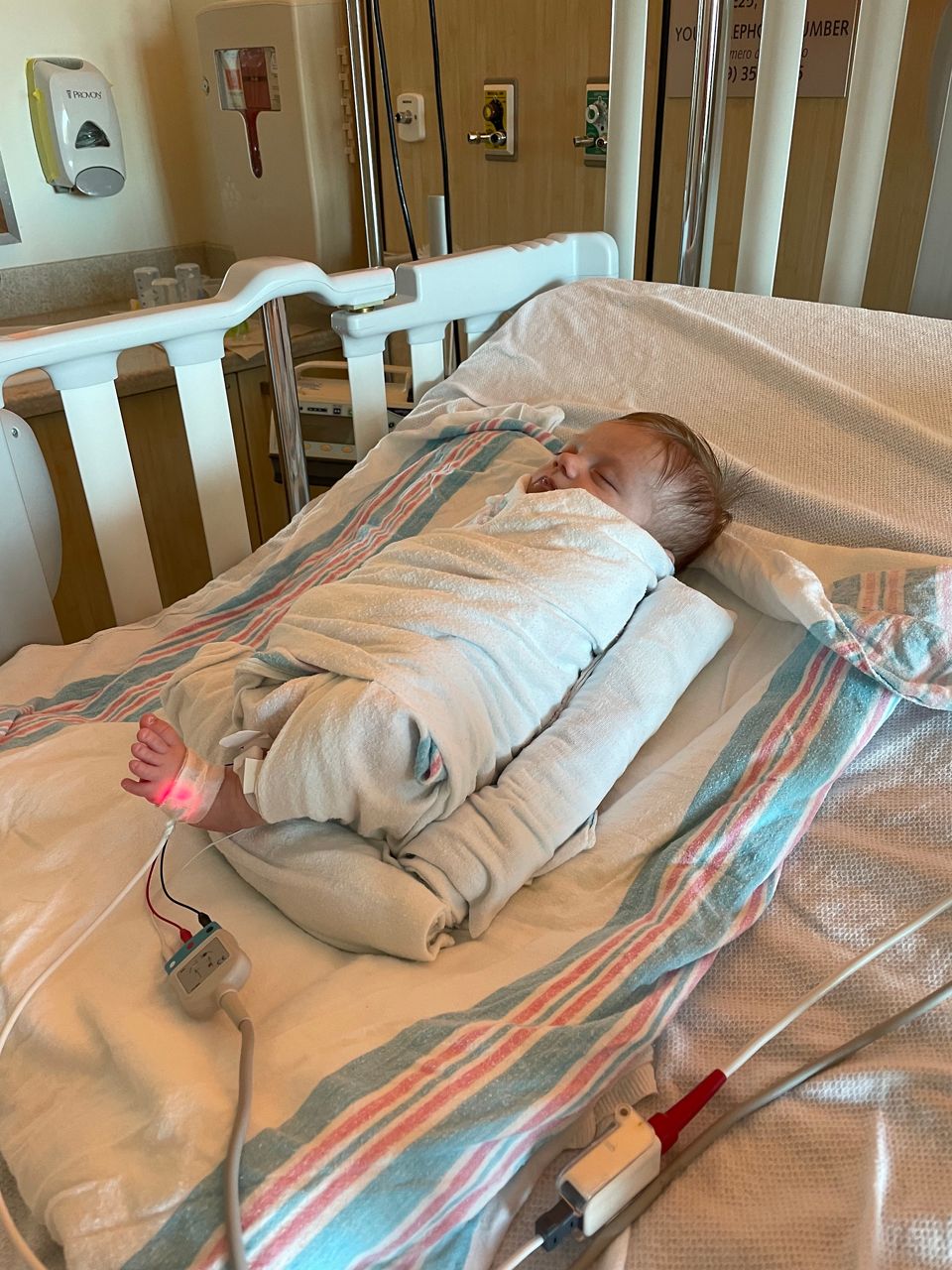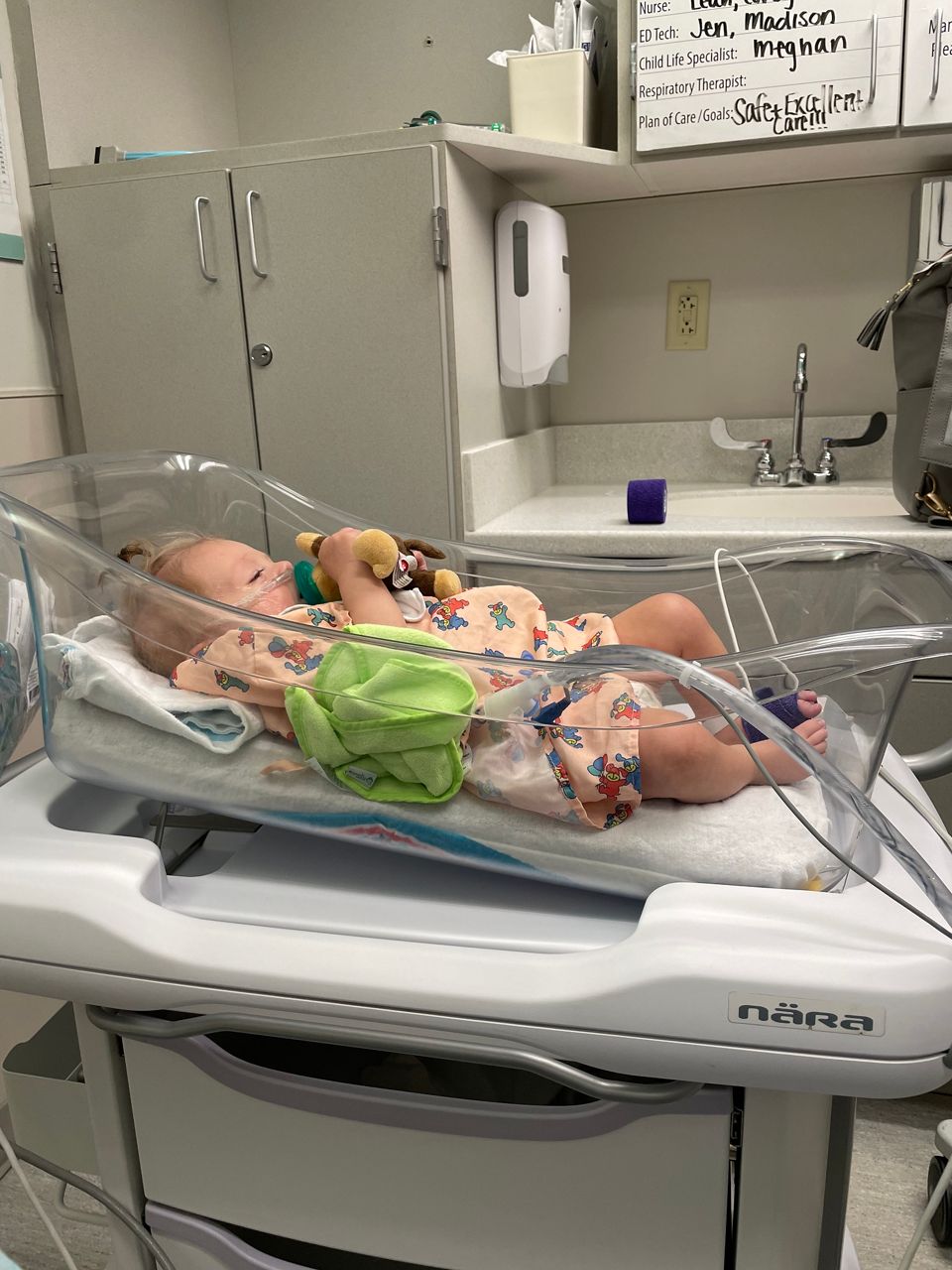RALEIGH, N.C. — Hospitals in the Triangle are brimming with COVID-19 patients. The North Carolina Department of Health and Human Services lists more than 850 adults with coronavirus in intensive care units.
What You Need To Know
Care for COVID-19 patients is delaying treatment for other illnesses in ICUs across the Triangle
Ashton Marquie said her daughter, Emerson, experienced a longer wait time to be treated for RSV
Emerson was born with a heart defect, along with breathing and digestive issues
For the month of August, a top physician at WakeMed confirmed 180 positive cases of RSV in their hospitals
The amount of attention every COVID patient needs impacts the timeliness of care for each non-COVID patient
Dr. Seth Brody, the chief physician executive at WakeMed, said when critical care beds are full of patients with COVID-19 it hurts the swiftness of care for everyone else.
Brody said during an hour-long call over WebEx, "They are working hard to maintain the level of care. They are still getting the top level of care and the best care, but there are times when you're waiting for certain services, there's no doubt about it."
Ashton Marquie can attest to that statement. Marquie said her 6-month-old daughter, Emerson, is recovering from a different respiratory virus after being hospitalized two days at WakeMed’s New Bern Avenue location in Raleigh.
Marquie said, “You can still see where her IV was in her hands.”
The young mother explained how her baby girl contracted respiratory syncytial virus in the middle of August.
“She is usually super happy and loves people. She’s never met someone that she didn’t want to play with,” Marquie said.
So when Marquie saw her child wasn’t acting like herself, she knew something was up.
“She was exhausted and acting like she was just miserable. She didn’t want anyone to hold her, love on her or play with her. She wanted us to just leave her alone and go to bed early,” Marquie said.
Emerson is Marquie’s first child. She said getting her daughter into the emergency room was the biggest challenge because right now, most attention is being diverted to patients with COVID-19.
Giving birth to a little girl during a pandemic isn’t easy. Add to that a heart defect, breathing and digestive issues.

Marquie shared a photo of her baby girl peacefully asleep after surgery at just 2 months old. Surgeons removed part of her epiglottis to help with food digestion and to open her airways.
"Everything in her life has been impacted by COVID,” Marquie said.
Indeed it has. Their first trip to the pediatric emergency room would reveal the newborn’s RSV infection.
She said initially doctors didn’t want to keep the infant overnight. "It’s tough, you never know exactly how hard you are supposed to push. You don’t know how to tell doctors something is wrong,” Marquie said.
According to the CDC, RSV is a common respiratory virus that usually causes mild, cold-like symptoms. Each year in the United States, an estimated 58,000 children younger than 5 years old are hospitalized due to RSV infection.
At first, Marquie thought Emerson might have the coronavirus even though she and her husband are vaccinated.
“Who am I to say something is wrong? But at the same time you have these instincts that tell you something isn’t right and we need to do something about it,” Marquie said.
When her daughter’s temperature rose to 104 degrees, she took action again.
The young parents returned to the same ER. On this trip, Emerson entered the ER on a Wednesday and was discharged from the hospital on a Friday. Marquie said during this time she saw firsthand the impact of overflow in capacity due to the delta variant.
"It's important that information is out there but at the same time we didn’t even think RSV could be a possibility,” Marquie said.
While nurses and physicians do all they can, the number of lives they are treating affects the timeliness of care they can give to each life.
Which impacts treatment for other issues like how soon a child, in this case, little Emerson, with preexisting conditions can be put on a breathing tube.

"It's very hard to see your kid wrapped up in wires and cords stuck in an infant bassinet that’s too small for them but it’s the only thing that can fit in the room so they can lay down," Marquie said.
For the month of August alone, Brody confirmed 180 positive cases of RSV on top of dealing with soaring patient intake from the most contagious version of the coronavirus.
The doctor also confirmed slower wait times to get a bed for critical care.
A Duke health expert says some signs of RSV are a cough, runny nose, fever, and lack of energy. It is best to have a family doctor see your child and conduct a nasal swab to determine what the symptoms are.



